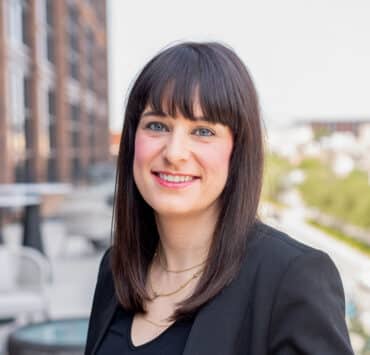|
Getting your Trinity Audio player ready...
|
The fantasy sports space is booming. According to the Fantasy Sports and Gaming Association, 23 percent of all American adults participated in sports betting in 2022 and 19 percent engaged in fantasy sports of some kind. And the numbers continue to grow.
Founded in 2020 by Jeremy Levine and Brandon Stakenborg, Underdog Sports, a fantasy sports, sports content, and sports betting platform, has experienced its own rocket ship growth. Since Nicholas Green took the reins of the fledgling legal department as the inaugural general counsel in 2022, he’s helped grow a company of seventy-five employees to over three hundred in just a year and a half. Whatever the special sauce that’s responsible for that explosive expansion is also what lured the former private practice partner in-house.
This is Green’s first turn as a general counsel, having spent time as a litigator and an appellate lawyer with regulatory dispute and legislative expertise prior to going in-house. He also spent four years as a law clerk on the US Court of Appeals for the Fifth Circuit and US District Court for the District of South Carolina. His pedigree seemed to indicate he was aspiring to have a prestigious life in law, but it couldn’t be any further from the truth.
“Law just seemed like a stable line of work, and I was lucky that it turned out to be something I really enjoy.”
Nicholas Green
“My parents didn’t graduate from college, and I didn’t really have a network of lawyers growing up to learn about the law,” he explains. “Law just seemed like a stable line of work, and I was lucky that it turned out to be something I really enjoy.”
Since taking a chance on law school, Green seemed to be on a rocket ship of his own creation. Prior to going in-house, the law partner was named a “Rising Star in Sports and Gaming Law” by Law360. So, what prompted an attorney seemingly capable of anything to leave private practice?
“I wanted to be part of the team that’s actually building the business,” Green reflects. “This is a high-growth company where everyone is on deck for a variety of issues. You add value any and every which way you can, and that idea of, ‘Who is a businessperson and who is a lawyer?’ just sort of melds together.”
The attorney says this is an opportunity to work in a disruptive and fledgling industry while also having access to the usual brick and mortar issues that come with the role of general counsel. As a second-wave company in fantasy sports and sports betting, Underdog has the “second-mover advantage,” Green says.
That ideology and emergence into the space may incur a fair amount of turbulence from industry incumbents, but he notes that Underdog is stacked with the vision and talent to continue its exponential growth well into the future. The fantasy and sports betting space is not free of controversy, and that’s why Green says the company takes its role as a responsible gaming advocate seriously.
“In any business that is taking money from consumers, you have an obligation to protect those consumers,” he says. “But I think we have a special obligation in the fantasy sports and betting environment. That’s why we’re making investments and innovation in the responsible gaming space and why we’ve gone well above what the law requires of us.”
“I think having a family makes me a better lawyer.”
Nicholas Green
Green says that fantasy sports and sports betting should augment the entertainment experience, not become the experience. Underdog wants to create content and engagement so sports fans can further enjoy a sport they already love. Short-term financial gains are never worth creating a culture of irresponsible gaming, one that can potentially dog an entire industry if left unattended.
That’s a lot on Green’s shoulders. He’s the first general counsel for an organization that is growing as fast as it can appropriately scale. But he remains proud of the legal team he’s helped build and mentor, lawyers he knows can go on to be general counsel someday in their own right. And as a former 24/7 firm attorney, there’s one behavior Green is intent on modeling for his people.
“I don’t make apologies for picking my kids up from school every day at 2:30 p.m.,” he admits. “I don’t apologize for my kids being around when I take a call, and I don’t want my team to either. I think having a family makes me a better lawyer. I hope our team here feels free to take that time when they need it, too. That culture makes all of us better lawyers and advisors.”

